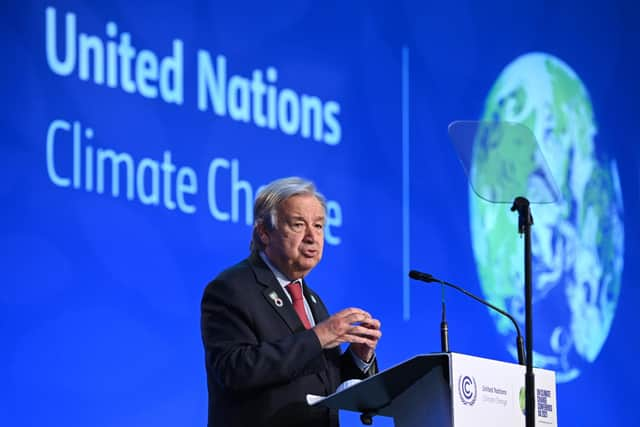Climate change: UK and Scottish governments must challenge oil companies to change or die – Dr Richard Dixon
United Nations Secretary-General António Guterres has stepped up his challenge to oil companies to stop blocking action on climate change, accusing them of trying to “knee-cap” climate progress. Earlier this year, Guterres used the launch of the latest set of dire warnings from the world’s climate scientists to call on all developed nations to reduce emissions to zero by as close to 2040 as possible saying “everything, everywhere, all at once” was needed to reduce emissions.
At the UN climate discussions in Bonn last week, he called on oil companies to “cease and desist” measures that aim to prevent progress, highlighting in particular legal threats which have made a number of countries leave international net-zero alliances. He also said the firms need to transform their plans so they stop producing “a product incompatible with human survival”.
Advertisement
Hide AdAdvertisement
Hide AdIt should not be underestimated how significant this escalated language of challenge is. It took the UN climate talks 29 years and 26 sets of talks before countries were brave enough to even mention the chief cause of climate change – fossil fuels.
Guterres’ challenge raises a bigger question: can the companies which have spent decades knowingly making the climate problem worse be trusted to lead us to a zero-emissions world? Some companies have made a real transformation of strategy.
Scottish Power used to run coal-fired power stations and was responsible for more than 20 per cent of all Scotland's emissions. The business is now based entirely on renewable energy.
Some oil companies have flirted with trying to look green. BP rebranded itself “Beyond Petroleum” in 2000 but this idea was allowed to simply fade away. Shell does have a renewables arm but it is a tiny fraction of its total investments. Under pressure from legal rulings in the Netherlands, it set a target to reduce its production of fossil fuels by 55 per cent by 2030. Its new chief executive has just scrapped this target.
A study before the Glasgow climate talks found that the five largest publicly traded oil companies spent about $1 billion on “misleading climate-related branding” and lobbying to delay and weaken action on climate change just in the four years after the landmark Paris Agreement was agreed in 2015. BP was the biggest spender.


In Scotland, the oil companies continue to refuse to take any responsibility for the emissions caused by the use of their products – it’s someone else's problem. Yet climate change is everyone's problem. They also continue to promote carbon capture and storage as the magic bullet which means we can continue to use fossil fuels forever. Even if this were true, the Scottish Government has had to admit that this technology will not be available at scale until well into the 2030s.
The Scottish Government and the unions are desperate for the oil companies to lead the transition to zero emissions. Yet we can see from the car industry that it was new company, Tesla, which broke the mould and drove the transition to electric vehicles, something which all other companies are now following.
It is not until the UK and Scottish governments stand up to the oil companies, challenging them to change or die, that we will be able to get serious about reaching zero emissions.
Dr Richard Dixon is an environmental campaigner and consultant
Comments
Want to join the conversation? Please or to comment on this article.